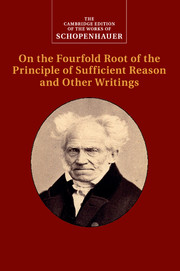Book contents
- Frontmatter
- Contents
- General Editor’s Preface
- Editorial Notes and References
- Introduction
- Notes on Text and Translation
- Chronology
- Bibliography
- Collation of the Two Editions of On the Fourfold Root
- 1 On the Fourfold Root of the Principle of Sufficient Reason
- 2 On Vision and Colours
- 3 On Will in Nature
- Glossary of Names
- Index
Animal Magnetism and Magic
Published online by Cambridge University Press: 30 June 2022
- Frontmatter
- Contents
- General Editor’s Preface
- Editorial Notes and References
- Introduction
- Notes on Text and Translation
- Chronology
- Bibliography
- Collation of the Two Editions of On the Fourfold Root
- 1 On the Fourfold Root of the Principle of Sufficient Reason
- 2 On Vision and Colours
- 3 On Will in Nature
- Glossary of Names
- Index
Summary
When my principal work appeared in the year 1818, animal magnetism had just begun to fight its way into existence. But as regards the explanation of it, although some light had been cast on the passive side, that is, on what happens to the patient, where the contrast between the cerebral and ganglionic systems, which had been advanced by Reil, had been made the principle of explanation; still the active side, the actual agent by means of which the magnetist evokes this phenomenon remained in the dark. People groped among all kinds of material principles of explanation, types such as Mesmer's all-penetrating world ether, or the skin respiration of the magnetist which von Stieglitz assumed to be the cause, etc. At best, ‘nerve-spirit’ had been advanced, which, however, is only a word for an unknown thing. The truth had hardly begun to dawn on a few who had been profoundly initiated through practice. But I was still far from hoping to receive from magnetism a direct corroboration of my theory.
But ‘time is a great teacher’, and so since that time the great schoolmaster, experience, has brought to light that the profoundly effective agent – which, proceeding from the magnetist, produces effects that appear to be so completely contrary to the law-governed course of nature that the longstanding doubt about them, the obstinate incredulity, the condemnation of a commission with Franklin and Lavoisier among the members, in short, everything that was opposed to magnetism in the first as well as in the second period (except the ignorant and stupid condemnation, carried out without inquiry, that prevailed in England until recently) is all completely excusable – but, I say, experience has brought to light that this agent is nothing else than the will of the magnetist. I do not believe that nowadays any doubt at all prevails about this among those who combine practice with insight, and I take it to be superfluous to cite the numerous magnetists’ statements that confirm it., Thus Puységur's and the older French magnetists’ rallying cry, veuillez et croyez!, i.e., ‘will with confidence’, has not only been proved by time, but has developed into a correct insight into the process itself.
- Type
- Chapter
- Information
- Schopenhauer: On the Fourfold Root of the Principle of Sufficient Reason and Other Writings , pp. 405 - 430Publisher: Cambridge University PressPrint publication year: 2012

